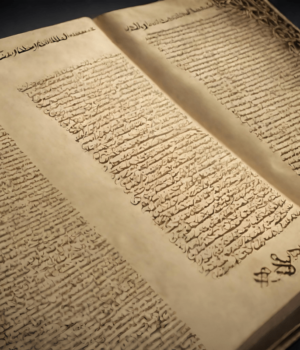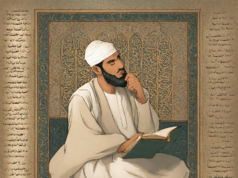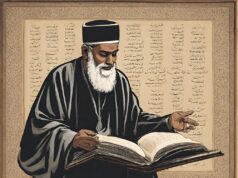
A Beautiful Manifesto for Non-Sectarian Islām.
A key Qur’ān-verified specimen we have repeatedly highlighted and drawn attention to time and again1 is the last waṣiyyah (will) of Amīr al-Mu’minīn Imām ʿAlī bin Abī Ṭālib (as) on his deathbed just before he returned back to his Creator. Each line of this waṣiyyah can be compared against the vision and worldview of the Qur’ān, including its belief system, and one fails to see any significant or substantial sectarian addition to it despite it being transmitted in both Shīʿa2 as well as Sunnī3 sources:
بِسْمِ اللَّهِ الرَّحْمنِ الرَّحِيمِ* هَذَا مَا أَوْصَى بِهِ عَلِيُّ بْنُ أَبِي طَالِبٍ أَوْصَى أَنَّهُ يَشْهَدُ أَنْ لَا إِلَهَ إِلَّا اللَّهُ وَحْدَهُ لَا شَرِيكَ لَهُ وَأَنَّ مُحَمَّداً عَبْدُهُ وَرَسُولُهُ أَرْسَلَهُ بِالْهُدى وَدِينِ الْحَقِّ لِيُظْهِرَهُ عَلَى الدِّينِ كُلِّهِ وَلَوْ كَرِهَ الْمُشْرِكُونَ .صَلَّى اللَّهُ عَلَيْهِ وَآلِهِ. ثُمَ إِنَّ صَلاتِي وَنُسُكِي وَمَحْيايَ وَمَماتِي لِلَّهِ رَبِّ الْعالَمِينَ. لا شَرِيكَ لَهُ وَبِذلِكَ أُمِرْتُ وَأَنَا مِنَ الْمُسْلِمِينَ. ثُمَّ إِنِّي أُوصِيكَ يَا حَسَنُ وَجَمِيعَ أَهْلِ بَيْتِي وَوُلْدِي وَمَنْ بَلَغَهُ كِتَابِي بِتَقْوَى اللَّهِ رَبِّكُمْ وَلا تَمُوتُنَّ إِلَّا وَأَنْتُمْ مُسْلِمُونَ. وَاعْتَصِمُوا بِحَبْلِ اللَّهِ جَمِيعاً وَلا تَفَرَّقُوا، فَإِنِّي سَمِعْتُ رَسُولَ اللَّهِ (ص) يَقُولُ : صَلَاحُ ذَاتِ الْبَيْنِ أَفْضَلُ مِنْ عَامَّةِ الصَّلَاةِ وَالصِّيَامِ وَأَنَّ الْمُبِيرَةَ الْحَالِقَةَ لِلدِّينِ فَسَادُ ذَاتِ الْبَيْنِ، وَلَا قُوَّةَ إِلَّا بِاللَّهِ الْعَلِيِّ الْعَظِيمِ. انْظُرُوا ذَوِي أَرْحَامِكُمْ فَصِلُوهُمْ يُهَوِّنِ اللَّهُ عَلَيْكُمُ الْحِسَابَ. اللَّهَ اللَّهَ فِي الْأَيْتَامِ فَلَا تُغِبُّوا أَفْوَاهَهُمْ وَلَا يَضِيعُوا بِحَضْرَتِكُمْ فَقَدْ سَمِعْتُ رَسُولَ اللَّهِ (ص) يَقُولُ : مَنْ عَالَ يَتِيماً حَتَّى يَسْتَغْنِيَ أَوْجَبَ اللَّهُ عَزَّ وَجَلَّ لَهُ بِذَلِكَ الْجَنَّةَ كَمَا أَوْجَبَ لآِكِلِ مَالِ الْيَتِيمِ النَّارَ. اللَّهَ اللَّهَ فِي الْقُرْآنِ فَلَا يَسْبِقُكُمْ إِلَى الْعَمَلِ بِهِ أَحَدٌ غَيْرُكُمْ. اللَّهَ اللَّهَ فِي جِيرَانِكُمْ، فَإِنَّ النَّبِيَّ (ص) أَوْصَى بِهِمْ وَمَا زَالَ رَسُولُ اللَّهِ (ص) يُوصِي بِهِمْ حَتَّى ظَنَنَّا أَنَّهُ سَيُوَرِّثُهُمْ. اللَّهَ اللَّهَ فِي بَيْتِ رَبِّكُمْ فَلَا يَخْلُو مِنْكُمْ مَا بَقِيتُمْ فَإِنَّهُ إِنْ تُرِكَ لَمْ تُنَاظَرُوا، وَأَدْنَى مَا يَرْجِعُ بِهِ مَنْ أَمَّهُ أَنْ يُغْفَرَ لَهُ مَا سَلَفَ. اللَّهَ اللَّهَ فِي الصَّلَاةِ فَإِنَّهَا خَيْرُ الْعَمَلِ؛ إِنَّهَا عَمُودُ دِينِكُمْ. اللَّهَ اللَّهَ فِي الزَّكَاةِ فَإِنَّهَا تُطْفِئُ غَضَبَ رَبِّكُمْ. اللَّهَ اللَّهَ فِي شَهْرِ رَمَضَانَ فَإِنَّ صِيَامَهُ جُنَّةٌ مِنَ النَّارِ. اللَّهَ اللَّهَ فِي الْفُقَرَاءِ وَالْمَسَاكِينِ فَشَارِكُوهُمْ فِي مَعَايِشِكُمْ. اللَّهَ اللَّهَ فِي الْجِهَادِ بِأَمْوَالِكُمْ وَأَنْفُسِكُمْ وَأَلْسِنَتِكُمْ فَإِنَّمَا يُجَاهِدُ رَجُلَانِ إِمَامٌ هُدًى أَوْ مُطِيعٌ لَهُ مُقْتَدٍ بِهُدَاهُ. اللَّهَ اللَّهَ فِي ذُرِّيَّةِ نَبِيِّكُمْ فَلَا يُظْلَمُنَّ بِحَضْرَتِكُمْ وَبَيْنَ ظَهْرَانَيْكُمْ وَأَنْتُمْ تَقْدِرُونَ عَلَى الدَّفْعِ عَنْهُمْ. اللَّهَ اللَّهَ فِي أَصْحَابِ نَبِيِّكُمُ الَّذِينَ لَمْ يُحْدِثُوا حَدَثاً وَلَمْ يُؤْوُوا مُحْدِثاً، فَإِنَّ رَسُولَ اللَّهِ (ص) أَوْصَى بِهِمْ وَلَعَنَ الْمُحْدِثَ مِنْهُمْ وَمِنْ غَيْرِهِمْ وَالْمُؤْوِيَ لِلْمُحْدِثِ. اللَّهَ اللَّهَ فِي النِّسَاءِ وَفِيمَا مَلَكَتْ أَيْمَانُكُمْ فَإِنَّ آخِرَ مَا تَكَلَّمَ بِهِ نَبِيُّكُمْ (ع) أَنْ قَالَ أُوصِيكُمْ بِالضَّعِيفَيْنِ النِّسَاءِ وَمَا مَلَكَتْ أَيْمَانُكُمُ. الصَّلَاةَ الصَّلَاةَ الصَّلَاةَ! لَا تَخَافُوا فِي اللَّهِ لَوْمَةَ لَائِمٍ، يَكْفِكُمُ اللَّهُ مَنْ آذَاكُمْ وَبَغَى عَلَيْكُمْ. قُولُوا لِلنَّاسِ حُسْناً كَمَا أَمَرَكُمُ اللَّهُ عَزَّ وَ جَلَّ. وَلَا تَتْرُكُوا الْأَمْرَ بِالْمَعْرُوفِ وَالنَّهْيَ عَنِ الْمُنْكَرِ فَيُوَلِّيَ اللَّهُ أَمْرَكُمْ شِرَارَكُمْ ثُمَّ تَدْعُونَ فَلَا يُسْتَجَابُ لَكُمْ عَلَيْهِمْ. وَعَلَيْكُمْ يَا بَنِيَّ بِالتَّوَاصُلِ وَالتَّبَاذُلِ وَالتَّبَارّ،ِ وَإِيَّاكُمْ وَالتَّقَاطُعَ وَالتَّدَابُرَ وَالتَّفَرُّقَ. وَتَعاوَنُوا عَلَى الْبِرِّ وَالتَّقْوى، وَلا تَعاوَنُوا عَلَى الْإِثْمِ وَالْعُدْوانِ. وَاتَّقُوا اللَّهَ إِنَّ اللَّهَ شَدِيدُ الْعِقابِ. حَفِظَكُمُ اللَّهُ مِنْ أَهْلِ بَيْتٍ وَحَفِظَ فِيكُمْ نَبِيَّكُمْ. أَسْتَوْدِعُكُمُ اللَّهَ وَأَقْرَأُ عَلَيْكُمُ السَّلَامَ وَرَحْمَةَ اللَّهِ وَبَرَكَاتِهِ. ثُمَّ لَمْ يَزَلْ يَقُولُ لَا إِلَهَ إِلَّا اللَّهُ لَا إِلَهَ إِلَّا اللَّهُ حَتَّى قُبِضَ صَلَوَاتُ اللَّهِ عَلَيْهِ وَرَحْمَتُهُ.
In the name of Allāh, the Most Gracious, the Most Merciful. This is what ʿAlī bin Abī Ṭālib has left as his waṣiyyah (last will and final testament), that he bears witness that there is no God but Allāh alone, without any partner, and that Muḥammad is His slave and Messenger, whom He sent with guidance and the religion of truth to establish and manifest it over all religions, even if the polytheists detest it. May Allāh bless him and his family. Then, ‘verily, my prayers, my rites, my living, and my dying are for Allah, the Lord of all the worlds. He has no partner, and with this, I have been commanded, and I am one of the Muslims’.
Next, I advise you, O Ḥasan, and all the members of my household, my children, and whoever receives my message, to observe and exercise taqwā (piety) towards Allāh, your Sustainer. Do not die except as Muslims!
‘Hold firmly to the rope of Allāh, all of you, and do not be divided.’ Verily, I heard the Messenger of Allāh (peace be upon him) saying: “Reconciliation of differences is better than general prayers and fasting, and the destroyer which ruins the religion is sowing discord and division. There is no power except with Allāh, the Exalted, the Great.
Look after your close relatives, and make things easy for them. So that Allāh may make the ḥisāb (reckoning and accountability to Allāh) easy for you.
(Remember) Allāh! (and fear) Allāh in the matter of orphans, do not subject them to neglect, and do not let them perish in your presence. I have heard the Messenger of Allāh (peace be upon him) saying: ‘He who brings up an orphan until he (i.e. the orphan) becomes self-sufficient, Allāh will make entering Paradise obligatory for him, just as He has made the fire obligatory for the one who devours the wealth and property of the orphan.
(Remember) Allāh! (and fear) Allāh in the matter of the Qur’ān; no one should surpass you in acting upon it.
(Remember) Allāh! (and fear) Allāh in the matter of your neighbors, for the Prophet (peace be upon him) gave lots of advice and recommendations in their favour, and the Messenger of Allāh (peace be upon him) kept recommending kindness to them until we thought he would give them a share in our inheritance.
(Remember) Allāh! (and fear) Allāh in the matter of the House of your Lord, see to it that it is never empty of you completely, for if you leave it unattended, you will not be granted respite, and the least reward that the one who visits it (i.e the House of Allāh) gets is forgiveness of all past sins.
(Remember) Allāh! (and fear) Allāh in the matter of ṣalāh (prayer), for it is the best of deeds; it is the pillar of your religion.
(Remember) Allāh! (and fear) Allāh in the matter of zakāt (obligatory charity), for paying it extinguishes the wrath of your Lord.
(Remember) Allāh! (and fear) Allāh in the matter of the month of Ramaḍān, for its fasting is a shield from the Hellfire.
(Remember) Allāh! (and fear) Allāh in the matter of the poor and the destitute, so make them partners in your livelihood (i.e. share some of what Allāh has given you with them).
(Remember) Allāh! (and fear) Allāh in the matter of jihād with your wealth, yourselves, and your tongues, for verily, only two men strive, one being an imām who calls to guidance, and the other following him in his guidance.
(Remember) Allāh! (and fear) Allāh in the matter of the offspring of your Prophet, so do not wrong them in your presence and don’t let them be oppressed while you have power and are able to defend them.
(Remember) Allāh! (and fear) Allāh in the matter of women and in what your right hands possess, for the last thing your Prophet spoke of was: ‘I advise you to be kind to the weaker sex, the women, and the slaves’, as that was the last thing he spoke of. Say good to people as Allāh has commanded you, and do not abandon enjoining good and forbidding evil, for if you do, Allāh will allow the evil ones among you to rule over you, then you will supplicate, but your supplications will not be answered. I enjoin upon you mutual goodwill, generosity, and giving precedence to others over yourselves. Beware of breaking off relations, hating each other, and being slow in good-doing and cooperation. ‘Seek assistance in virtue and piety, and do not seek assistance in sin and aggression. Fear Allāh, for verily, Allāh is severe in punishment.’ May Allāh protect you from the people of my household and preserve in you my Prophet. I entrust you to Allāh and read the peace, mercy, and blessings of Allāh upon you. Then, he kept saying, ‘Lā ilāha illa Allāh’ until he passed away; Allāh’s prayers and mercy be upon him.4
Imām ʿAlī’s (as) non-sectarian Priorities and Concerns on his Deathbed
It is so very striking how there is no mention of, or emphasis on, beliefs, practices and rituals which sectarian paradigms devote all their focus and attention to – in this last and final will of Imām ʿAlī (as). There is no mention of Divine Imāmah or Twelve Imāms, even as a prophecy, or the necessity of believing in the next Imāms, or any attempt to guide the ummah to who they will be. Rather, we see a purely Qur’ānic document reflecting the agenda and worldview of the Qur’ān.
We see here a non-sectarian manifesto which promotes the Qur’ānic requirements of belief in Allāh and His Messenger, and upholding the core obligations, rituals, as well as ethical and moral teachings of Islām which are repeatedly highlighted and emphasised in the Qur’ān.
It is a very far cry indeed from the sectarian Imāmī narrative where Wilāyah and Imāmah came to be seen as the end-all-be-all of Islām, and its most important and emphasised pillar5. Imām ʿAlī (as) clearly didn’t consider it worth drawing attention towards in his last will and testament, even as he affirmed belief in tawḥīd (Islāmic monotheism) and Risālah (Messengership and Prophethood), and even as he included special words in it about the importance of honoring the family and progeny of the Prophet (Saww), and the necessity of defending them and warding off any oppression from them. But he does not point to any divine mandate for them nor does anything he says in it reflect the kind of Imāmocentric worldview that came to dominate the later Shīʿa Imāmī sects and break-away splinter groups.
This waṣiyyah was dictated before the most beloved and closest family of Imām ʿAlī (as) so it cannot be argued that he was resorting to taqiyyah (tactical dissimulation) and hiding crucial information in it.
All of this serves to vividly demonstrate how Imām ʿAlī’s (as) legacy is not a sectarian or divisive one. He was upon the dīn of Islām which the Prophet (Saww) brought, and he didn’t seek to create any sect within it or add anything to it. His belief system didn’t have in it anything over and above what the Qur’ān mandates in its verses. He was a pre-sectarian Muslim and Mu’min, and the best role model for such Muslims after the Prophet (Saww). It is this pre-sectarian and non-sectarian Islām that we must seek to uphold and invite people towards if we truly wish to honour the life and legacy of our beloved Imām Amīr al-Mu’minīn ʿAlī bin Abī Ṭālib (as).
References
- To access the lecture where these reminders have been issued, one may refer to the Al Islaah Playlist entitled Specific Days & Nights https://www.youtube.com/playlist?list=PLtu4Nz3xrIMJ3AGTOc2hfEWRvY6_fxx0J
↩︎ - See: Al-Kulaynī, Abū Ja’far Muḥammad bin Yaʿqūb. Al Kāfī. Ed. ʿAlī Akbar al-Ghaffārī. Dār al-Kutub al-Islāmiyyah (Maktabah al-Ṣadūq), Tehran, 2nd ed., 1381 AH., vol. 7, pp. 51-52. [Narration # 7].
(https://lib.eshia.ir/11005/7/51 – https://lib.eshia.ir/11005/7/52).
For English translation, one may refer to: https://thaqalayn.net/hadith/7/1/35/7.
See also: Al-Ḥarrānī, Shaykh Abū Muḥammad al-Ḥasan bin ʿAlī bin al-Ḥusayn bin Shuʿbah. Tuḥaf al-ʿUqūl ʿan Āl al-Rasūl. Ed. ʿAlī Akbar al-Ghaffārī. Muʾassasat al-Nashr al-Islāmī al-Tābiʿah li Jamāʿat al-Mudarrisīn bi Qum al-Musharrafah, Qum, 2nd ed., 1404 AH., pp. 197-199.
(https://lib.eshia.ir/15139/1/197 – https://lib.eshia.ir/15139/1/199).
Authentication: Deemed Ṣaḥīḥ (authentic) by: Al-Majlisī, ʿAllāmah Muḥammad Bāqir.
Mir’āt al ʿUqūl Fī Sharḥ Akhbār Āl al-Rasūl. Dār al-Kutub al-Islāmiyyah, Tehran, 2nd ed., 1412 AH., vol. 23, p. 83.)
(https://lib.eshia.ir/71429/23/83).
However, the actual authenticity of the content of this Waṣiyyah is best established by comparing its contents against the Qur’ān, and anyone who endeavours to do that will find that the teachings mentioned in it to be mirroring the guidance of the Qur’ān, and this is the greatest evidence of the overall veracity of this narration and its reliability in general. There are some slight variations in the use of some phrases in different versions of this Waṣiyyah, but those do not significantly affect the overall thrust and drift of the document in our humble view, and we will explore the implications of these minute variations at a later stage, God-Willing.
↩︎ - See: Al-Ṭabarī, Abū Jaʿfar, Muḥammad bin Jarīr. Tārīkh al-Ṭabarī: Tārīkh al-Rusul wa-l-Mulūk. Ed. Muḥammad Abū al-Faḍl Ibrāhīm. Dār al-Maʿārif, Cairo, 2nd ed., 1387 AH/1967 CE., vol. 5, pp. 147- 148.
(https://shamela.ws/book/9783/2608#p4 – https://shamela.ws/book/9783/2609#p1).
See also: Ibn Aʿtham al-Kūfī, ʿAllāma Abū Muḥammad Aḥmad. Kitāb al-Futūḥ. Ed.ʿAlī Shīrī. Dār al-Aḍwāʾ, Beirut, 1st ed., 1411 AH/1991 CE., vol. 4, p. 280-281. (https://lib.eshia.ir/40046/4/280 – https://lib.eshia.ir/40046/4/281).
↩︎ - Al-Kulaynī, Abū Ja’far Muḥammad bin Yaʿqūb. Al Kāfī. Ed. ʿAlī Akbar al-Ghaffārī. Dār al-Kutub al-Islāmiyyah (Maktabah al-Ṣadūq), Tehran, 2nd ed., 1381 AH., vol. 7, pp. 51-52. [Narration # 7].
(https://lib.eshia.ir/11005/7/51 – https://lib.eshia.ir/11005/7/52).
↩︎ - As is claimed in reports no. 1, 3, and 8, in Al-Kāfī, by Al-Kulaynī, (Ed. ‘Alī Akbar al-Ghaffāri), Maktabah al-Sadūq, Tehran, 2nd ed., 1381 AH., vol. 2, pp. 18-21. These narrations reportedly claim ولم ينادى بشيء كما نودي بالولاية, i.e. “none of the fundamental tenants of the Islamic faith were emphasised and stressed as much as Wilāyah!” These narrations can be accessed online from the following links:
https://thaqalayn.net/hadith/2/1/13/1
https://thaqalayn.net/hadith/2/1/13/3
https://thaqalayn.net/hadith/2/1/13/8
The irony of their claim should not be lost on those who possess sharp intellects and possess the gift of critical thinking, for the Qur’ān features such repeated and frequent reminders about all the fundamental tenants of the Islamic faith such as Tawḥīd (Islamic Monotheism), Risālah (Messengership/Prophethood), Maʿād (Return to the Creator in the Afterlife), and every other fundamental teaching of Islam, except for later sectarian additions such as the traditional Twelver Shia conception of Imāmah/Wilāyah. Such accretions to the faith are only conspicuous by their absence in the Qur’ān.
It is also worth noting that even the Akhbārī scholar, ʿAllāmah Muḥammad Bāqir al-Majlisī (d. 1110 AH/1699 CE), known for his laxity in ʿIlm al-Rijāl, admitted that at least narrations no. 1 and 8 are manifestly weak and unreliable by even Akhbārī Imāmī Rijālī standards. See his: Mir’āt al ʿUqūl Fī Sharḥ Akhbār Āl al-Rasūl. Dār al-Kutub al-Islāmiyyah, Tehran, 2nd ed., 1412 AH., vol. 7, pp. 100 and 112 respectively. He authenticated Ḥadīth no. 3 with his characteristically weak and uncritical Rijālī methodology, though. See: ibid, p. 101.
However, relatively stricter Uṣūlī Ḥadīth experts and scholars of Rijāl such as ʿAllāmah Muḥammad Bāqir al-Bahbūdī have seen through the flaws in its chain, and have thus also discredited Hadith no. 3 as well, and omitted it from the collection of authentic reports from Al Kāfī. See his Ṣaḥīḥ al-Kāfī. Al-Dār al-Islāmiyyah, Beirut, 1st ed., 1401 AH/1981 CE, vol. 1, pp. 67-68. ↩︎





